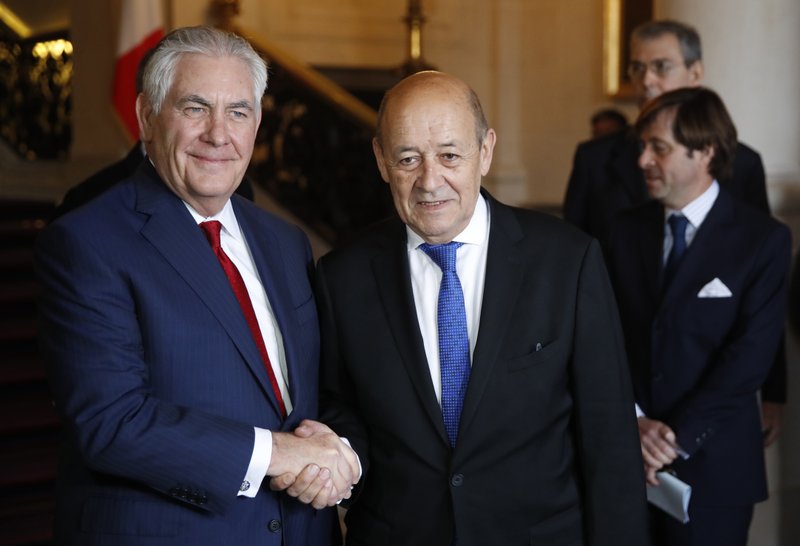PARIS -- President Donald Trump's administration on Tuesday pressed ahead with efforts to convince European allies to add tough new requirements to the Iran nuclear deal, a move met with deep skepticism in France where the foreign minister insisted "signatories must stand by their word."
A day after similar talks in London with British officials, U.S. Secretary of State Rex Tillerson met with French Foreign Minister Jean-Yves Le Drian to make the case.
The two greeted each other cordially at the French foreign ministry, but ahead of the meeting, Le Drian expressed annoyance that the U.S. was pressuring Europe to redesign the deal to prevent Trump from withdrawing from it.
"There is a basic principle on which we are very firm, it's the upholding of the [nuclear deal] to the extent it is respected," Le Drian said, noting that the United Nations nuclear monitor, the International Atomic Energy Agency, has said Iran is in compliance.
"If it is respected by Iran -- which is what the [U.N. agency] says, and we don't have any reason not to believe it -- the signatories must stand by their word," Le Drian added. "Because when an agreement is signed, each signatory must respect it. [Tillerson] knows it."
Le Drian also questioned why the Trump administration is "kicking the ball back to Congress and the Europeans," when Russia and China also signed the deal.
Trump has threatened to abandon the deal this spring unless it is fixed to his liking. Tillerson is in Europe this week seeking support for a side deal under which the Europeans would join the U.S. in reimposing sanctions on Iran if it continues ballistic missile testing, refuses U.N. inspections of sensitive sites or resumes advanced atomic work even if such activity is gradually permitted by the nuclear deal.
The administration is also working with Congress to amend or replace U.S. legislation that governs Washington's participation in the nuclear deal, which was a signature foreign policy achievement of President Barack Obama's administration but has been denounced by Trump as the worst agreement ever negotiated by the United States.
After his talks with British officials on Monday in London, Tillerson sounded cautiously optimistic about getting European backing. He said the U.S. and Britain, France and Germany had a "common view" that the nuclear deal should be supplemented. He said the four countries had agreed to set up a working group of experts on fixing what Trump says are flaws in the deal. The working group is expected to start meeting as early as next week, he said.
The nuclear deal gave Iran billions in sanctions relief in return for curbs on its atomic program.
But earlier this month, Trump vowed to stop waiving U.S. sanctions unless the Europeans agreed to strengthen its terms by consenting to a side deal that would effectively eliminate provisions that allow Iran to gradually resume some advanced atomic work. Trump also wants tighter restrictions on Iran's ballistic missile program.
Iran has rejected any renegotiation. Britain, France and Germany have expressed some willingness to work with the U.S. to prevent the deal from collapsing.
Earlier Tuesday, Vice President Mike Pence reiterated to Israeli leaders that the Trump administration plans to pull out of the landmark 2015 nuclear deal unless the pact is amended.
The remarks came as Pence wrapped up his visit to Israel. Pence met with Israeli President Reuven Rivlin and vowed the United States would counter the Iranian nuclear threat.
He noted U.S. efforts to gain support from European allies to address what he described as flawed parts of the agreement, adding that Trump "has made clear" the U.S. will leave the nuclear deal if that doesn't happen.
"We are sending a signal to our European allies that the time has come for changes in the Iran nuclear deal," Pence said, sitting alongside Rivlin. "Punitive sanctions will be available for many years to come to prevent Iran from obtaining a nuclear weapon, and you have our commitment to work closely with our allies around the world to achieve that."
He then wrapped up his trip with a solemn visit to the holiest site where Jews can pray. Pence tucked a small white note of prayer in the cracks of the Western Wall in Jerusalem's Old City after touring the Yad Vashem Holocaust memorial with Israeli Prime Minister Benjamin Netanyahu.
Wearing a Jewish skullcap on his head, he held his right hand on the wall momentarily, his eyes closed.
Pence aides called it a "personal visit," in the same manner in which Trump prayed there during his visit to Israel last year. The vice president was joined by Rabbi Shmuel Rabinovitch, the rabbi of the wall, and Mordechai "Suli" Elias, the director general of the Western Wall Heritage Foundation.
Information for this article was contributed by Angela Charlton, Ken Thomas, Aron Heller and Darlene Superville of The Associated Press.
A Section on 01/24/2018
